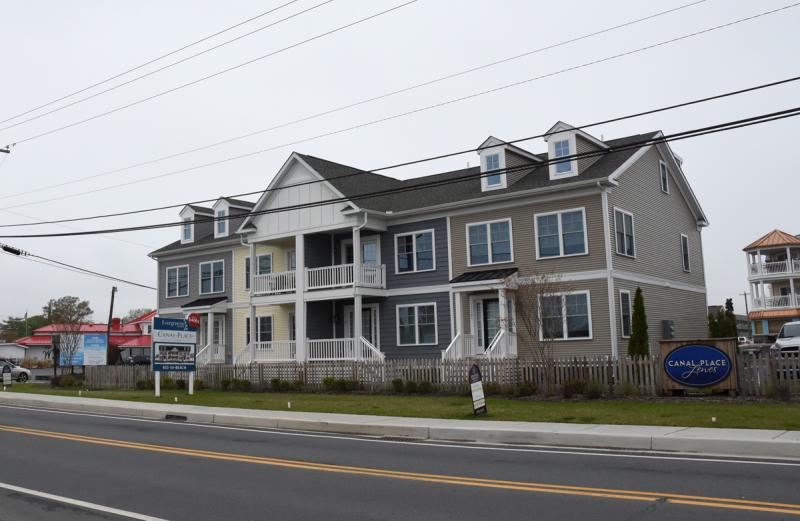More than three years after placing a moratorium on townhouses in the Lewes’ marine-commercial zoning district, mayor and city council are reviewing options moving forward.
In March 2014, council placed a moratorium on special exceptions for residential development after two townhouse projects in the district quickly gained approval from the board of adjustment.
Denniston Place features eight units at the corner of Savannah Road and Massachusetts Avenue, while Evergreene Homes’ Canal Place is nearing completion, with nine units at the corner of Savannah Road and Anglers Road.
A third project was considered near the beach, where a developer had approached the city to rezone a property to marine-commercial with the intent of using the special exception to build townhouses. That plan was not well received and it was scrapped.
Council is expected to take some action on the topic at its May regular meeting. Officials appeared to reach consensus at an April 20 meeting to remove the long-standing moratorium, but also take swift action to remove residential-related special exceptions from the zoning code. Further actions could occur later, as council continues to review its options within the district.
Mayor Ted Becker said the marine-commercial district was created to maintain access to the waterfront, create a district that would promote marine-related activities and preserve the city’s connection to the waters.
The marine-commercial district runs along the Anglers Road side of the Lewes-Rehoboth Canal. It also stretches down Savannah Road to Massachusetts Avenue.
Without a special exception, a developer who wants to build residential units is required to include commercial space on the ground floor. The Beacon Motel, Hotel Blue and Captain’s Quarter each comply with the requirement.
City officials feared allowing townhouses in this zone via a special exception would threaten the essence of Lewes a boating town, Becker said. If the boat yard at the end of Anglers Road were to be converted to townhouses, the connection to the sea – one of the city’s core values – could be lost.
“There’s only one place you can buy gas as a boater and that’s [the boatyard],” he said. “If there’s no opportunity for people to refuel their boat, you have essentially shut down the harbor.”
City officials also have a desire to extend the downtown district over the canal and along Savannah Road.
“There was some concern that this was going to become more like the entrance to Rehoboth, where it’s townhouses on both sides,” said Councilwoman Bonnie Osler, discussing council’s thinking in 2014. “We didn’t want that to become the introduction to the city’s beach without council thinking through what it wanted.”
The special exception was brought to the table at the request of realtors.
“It was corroborated by realtors who said they were unable to sell the Evergreene property,” Becker said. “The hotel had been demolished and it was sitting as a vacant, rather unattractive piece of ground, and we heard from realtors who were saying there was no interest in it as a commercial property.”
Becker said that may have changed in the last few years. He pointed to the success of the Pig and Publican in the Beacon Motel as an example.
In fall 2014, council had planning consultant Environmental Resources Management study the marine-commercial district and offer recommendations. Planner Tom West reviewed ERM’s report and offered his own thoughts.
“Developers saw [the district] as ideal land and wanted to develop it pretty quickly,” he said. “If it happens too much, especially along the canal, then you’ve lost the main objective of the district.”
He supported one ERM’s recommendation to split the district, making the canalfront properties along Anglers Road one district and the Savannah Road properties another. He said council could consider changing Savannah Road properties to general commercial.
If council moves forward with removing the special exception, they indicated that they may consider adding revised residential-related regulations or other actions, such as splitting the district into two, in the future.
Councilwoman Bonnie Osler said agreed marine-commercial is not working on the Savannah Road stretch.
“If the intent was that the commercial along Savannah Road be marine-oriented, then that hasn’t panned out,” she said, pointing to the art gallery, market and restaurants in the area.
In both general commercial and marine-commercial, residential may be built above commercial space. One of the major differences between the two zoning districts is that second-floor restaurants are allowed in marine-commercial, but not general commercial.
Rick Quill, a co-owner of the property at the corner of Savannah Road and Cape Henlopen Drive, across from the Dairy Queen, recently submitted a request to the city to rezone his property from general commercial to marine-commercial.
“The rationale [for a second-floor restaurant] was that in general commercial, particularly in downtown, they are frequently immediately adjacent to residential neighborhoods,” Becker said. “There was no desire to have a restaurant facility directly across from an apartment or a hotel that would then have a dining room at eye level.”
Irish Eyes and Fishermen’s Wharf, each in marine-commercial, each have second-floor dining spaces. The only general commercial restaurant with second-floor access is Agave’s cocktail lounge, but Becker said there are very specific rules the restaurant must follow in order to operate.
















































